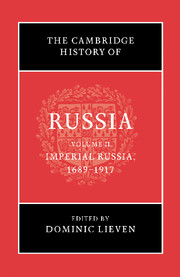Crossref Citations
This Book has been
cited by the following publications. This list is generated based on data provided by Crossref.
Sunderland, Willard
2010.
The Ministry of Asiatic Russia: The Colonial Office That Never Was But Might Have Been.
Slavic Review,
Vol. 69,
Issue. 1,
p.
120.
Tyulenev, Sergey
2010.
Translation in Intersystemic Interaction: A Case Study of Eighteenth-Century Russia1.
TTR,
Vol. 23,
Issue. 1,
p.
165.
Behrends, Jan C.
2011.
Visions of civility: Lev Tolstoy and Jane Addams on the urban condition infin de siècleMoscow and Chicago.
European Review of History: Revue europeenne d'histoire,
Vol. 18,
Issue. 3,
p.
335.
Lemarchand, Guy
2011.
Paysans et seigneurs en Europe.
p.
355.
MORRISON, ALEXANDER
2014.
Twin Imperial Disasters. The invasions of Khiva and Afghanistan in the Russian and British official mind, 1839–1842.
Modern Asian Studies,
Vol. 48,
Issue. 1,
p.
253.
Barnett, Vincent
2014.
M. Kh. Reutern and Tariff Reform in Russia.
OEconomia,
p.
17.
Šaur, Josef
2015.
Boris Nikolajevič Čičerin o ruských dějinách (státní škola jako historiografický a společenský fenomén).
2017.
A History of Russia, Central Asia and Mongolia.
p.
143.
MORRISON, ALEXANDER
2017.
Beyond the ‘Great Game’: The Russian origins of the second Anglo–Afghan War.
Modern Asian Studies,
Vol. 51,
Issue. 3,
p.
686.
2017.
A History of Russia, Central Asia and Mongolia.
p.
209.
Møller, Jørgen
2018.
Medieval Roots of the Modern State: The Conditional Effects of Geopolitical Pressure on Early Modern State Building.
Social Science History,
Vol. 42,
Issue. 2,
p.
295.
Petrov, Yury
2019.
Russia on the Eve of the Great Revolution of 1917.
Russian Studies in History,
Vol. 58,
Issue. 1,
p.
10.
Oliveira, A. R. E.
2019.
Explorations in the History and Heritage of Machines and Mechanisms.
Vol. 37,
Issue. ,
p.
338.
Kamusella, Tomasz
2019.
Derek Offord, Vladislav Rjéoutski and Gesine Argent:The French Language in Russia: A Social, Political, Cultural, and Literary History(Languages and Culture in History).
Journal of Historical Sociolinguistics,
Vol. 5,
Issue. 2,
Papa, I.
2019.
“DIPLOMATIC FRONT” DURING THE GREAT NORTHERN WAR: DIPLOMATIC MISSION OF JUST JUEL TO PETER I (1709-1711).
Bulletin of Taras Shevchenko National University of Kyiv. History,
p.
31.
Tropov, I. A.
Fedkin, A. V.
and
Konkin, A. A.
2020.
Women Workers of St. Petersburg in the Late 19th — early 20th Centuries.
Nauchnyi dialog,
p.
335.
Bowden, Bradley
2020.
The Palgrave Handbook of Management History.
p.
1105.
Swatek-Evenstein, Mark
2020.
A History of Humanitarian Intervention.
Bowden, Bradley
2020.
The Palgrave Handbook of Management History.
p.
1.
Cortesi, Luca
2021.
Russian First World War Propaganda Literature through Its Anthologies. Some Observations on Russian Soldier-Literature and Journalistic Reporting.
Literature,
Vol. 1,
Issue. 2,
p.
58.



